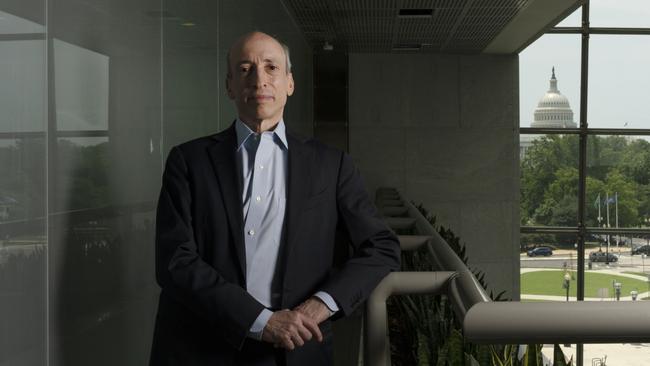Crypto ‘Wild West’ needs stronger investor protection, SEC chief says
Gary Gensler highlights platforms that allow investors to borrow against cryptocurrencies.

The Securities and Exchange Commission will regulate cryptocurrency markets to the maximum extent possible using its existing authority, Chairman Gary Gensler said Tuesday, while also calling on Congress to grant the agency more scope and resources to oversee the sector.
Calling the asset class rife with “fraud, scams and abuse,” Mr. Gensler signalled the SEC is likely to become more active in policing crypto trading and lending platforms, as well as so-called stablecoins.
“We just don’t have enough investor protection in crypto. Frankly, at this time, it’s more like the Wild West,” Mr. Gensler said in prepared remarks to the Aspen Security Forum. “We have taken and will continue to take our authorities as far as they go.” U.S. financial regulators have struggled to get their arms around the fast-growing world of cryptocurrency and related financial technologies. Unlike in the securities and derivatives markets, no single regulator oversees crypto exchanges or brokers. As the market value of the asset class has exploded to more than a trillion dollars, so have scams.
Mr. Gensler said large parts of the sector operate outside of regulatory frameworks that seek to protect investors and consumers, reduce crime, promote financial stability and protect national security.
“If this innovation has any chance of surviving into the, you know, late 2020s and 2030s, it can’t stay astride of the public policy,” said Mr. Gensler, a veteran Democratic regulator who taught a course on cryptocurrency at the Massachusetts Institute of Technology.
Mr. Gensler’s speech comes amid growing recognition from some lawmakers and Biden administration appointees that the crypto market has become large enough and important enough to require more oversight.
In May, Sen. Elizabeth Warren (D-Mass.) wrote to Mr. Gensler asking about the commission’s ability to protect investors. This week, Rep. Don Beyer (D-Va.) introduced a bill that would create laws around the entire digital-asset sector.
“We’re going to see more enforcement activity, I think it’s inevitable,” said Stephen Palley, a partner at the law firm Anderson Kill whose clients include crypto companies. “My thinking is people who get ahead of it and engage may end up doing better.” Mr. Gensler has told House lawmakers that investor protection rules should apply to crypto exchanges, similar to those that cover equities and derivatives. Regulated exchanges are required by law to have rules that prevent fraud and promote fairness.
“While this asset class continues to grow, it’s critical that regulators work with industry to come to sensible positions so that the full benefits of the technology can be realised,” said Michelle Bond, CEO of the Association for Digital Asset Markets.
In his speech Tuesday, Mr. Gensler highlighted a range of areas in which the SEC could expand its purview.
One of them is decentralised finance, or DeFi, software applications that allow users to borrow, lend, earn interest and trade assets and derivatives. Some DeFi developers say the technology shouldn’t face federal oversight because the automated programs aren’t controlled by people or companies and don’t hold traders’ assets. The services are often used by people seeking to borrow against their cryptocurrency holdings to place larger bets.
Investors have poured tens of billions of dollars into DeFi over the past 12 months, often seeking yields on their crypto assets far greater than they could achieve through dollar-based interest rates. The assets deposited as collateral with DeFi projects have swelled to $US85 billion from around $US3 billion a year ago, according to data provider DeBank.
DeFi advocates say they are building an innovative alternative to traditional finance, but the space is also riddled with scams. From January to April, DeFi frauds cost investors $US83.4 million, according to CipherTrace, an analytics firm.
“The world of crypto finance now has platforms where people can trade tokens and other venues where people can lend tokens,” Mr. Gensler said. He said he believes these platforms can be subject to securities laws and may also be subject to commodities and banking laws.
Mr. Gensler said stablecoins – digital assets pegged to the value of national currencies – also may meet the definition of securities or investment companies, which would also put them within the SEC’s jurisdiction.
Traders typically use stablecoins to exchange one crypto asset for another, Mr. Gensler said, noting that, in July, almost three-fourths of trading on cryptocurrency platforms occurred between a stablecoin and some other token.
“The use of stablecoins on these platforms may facilitate those seeking to sidestep a host of public policy goals connected to our traditional banking and financial system: anti-money-laundering, tax compliance, sanctions and the like,” Mr. Gensler said.
There are $US113 billion worth of stablecoins in circulation, according to the Block, a crypto news and research firm. Nearly half of that is in tether, a stablecoin pegged to the U.S. dollar. In February, the companies behind tether and an affiliated bitcoin exchange agreed to pay $US18.5 million to resolve an investigation by the New York attorney general’s office over alleged public misrepresentations on the reserves underpinning tether. The companies neither admitted nor denied wrongdoing.
Mr. Gensler on Tuesday hinted at the possibility of additional enforcement actions against crypto assets and trading platforms that the SEC deems to be securities. To make that determination, regulators look at whether the investment was made in a “common enterprise” and whether anticipated profits depend on the efforts of others.
“Folks buying these tokens are anticipating profits, and there’s a small group of entrepreneurs and technologists standing up and nurturing the projects,” Mr. Gensler said. “I believe we have a crypto market now where many tokens may be unregistered securities.” Because they aren’t registered with the SEC as broker-dealers, U.S. crypto trading platforms generally permit trading only in assets they believe aren’t securities. Coinbase, a crypto exchange that went public earlier this year, said in an SEC filing that it could face penalties if regulators conclude that its platform is used to trade unregistered securities.
Mr. Gensler said it is unlikely that, of the more than 50 tokens offered by a typical crypto-trading platform, none constitute securities.
“I do encourage those platforms to come in and talk to us. Register. Probabilities are you’ve got securities on your platforms,” Mr. Gensler said.
Alexander Osipovich and Paul Vigna contributed to this article
The Wall Street Journal







To join the conversation, please log in. Don't have an account? Register
Join the conversation, you are commenting as Logout